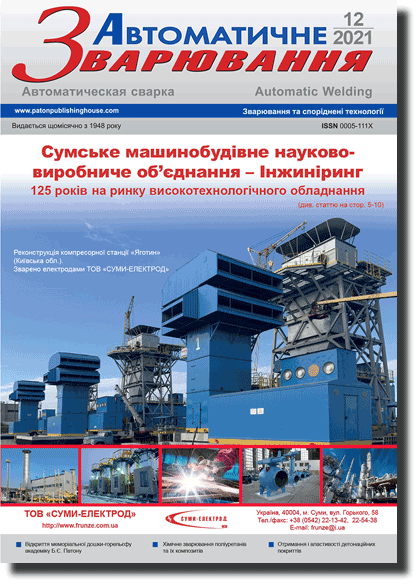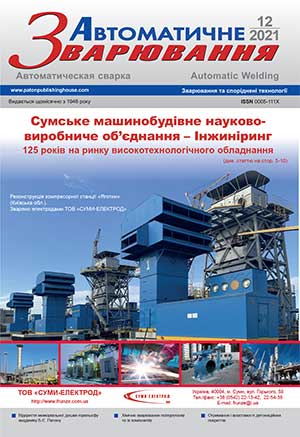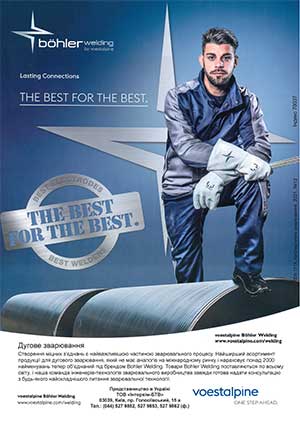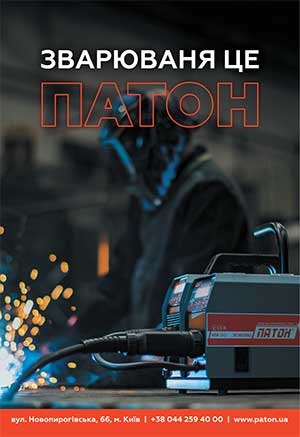| 2021 №12 (04) |
DOI of Article 10.37434/as2021.12.05 |
2021 №12 (06) |
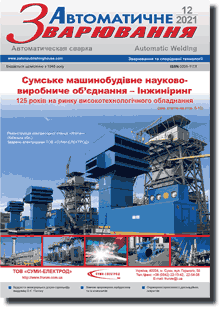
"Avtomatychne Zvaryuvannya" (Automatic Welding), #12, 2021, pp. 38-45
Producing and properties of detonation coatings based on FeMoNiCrB amorphizing alloy with addition of strengthening phases
Yu.S. Borisov, A.L. Borisova, T.V. Tsimbalista, A.I. Kildiy, K.V. Yantsevich, Z.G. Ipatova
E.O. Paton Electric Welding Institute of the NAS of Ukraine. 11 Kazymyr Malevych Str., 03150, Kyiv, Ukraine. E-mail: office@paton.kiev.ua
The structure and properties of amorphizing composite detonation coatings based on FeMoNiCrB alloy were studied. FeMoNiCrB + ZrB2, FeMoNiCrB + (Ti,Cr)C, FeMoNiCrB + FeTiO3 composite powders were used for coatings deposition, which were produced from a mixture of the composition powders by mechanical alloying. It is found that as a result of detonation spraying of all the powder compositions, the formed coatings have dense, lamellar multiphase structure. The coating composition includes Fe(Ni,Cr) solid solutions, Mo2FeB2 and Fe2B borides, dispersed inclusions of alloying additives (ZrB2, (Ti,Cr)C, FeTiO3) and oxides (ZrO2 and FeCr2O4 or Fe2O3, or Fe3O4), as well as an amorphous phase, the amount of which in the coating structure has increased, as a result of the detonation spraying process. The values of microhardness, corrosion resistance, fatigue life and wear resistance of the composite detonation coatings are given. 12 Ref., 6 Tabl., 4 Fig.
Keywords: detonation spraying, composite powders, amorphizing iron alloy, zirconium boride, titanium-chromium carbide, iron titanate, coating, corrosion resistance, wear resistance Ключові слова: детонаційне напилення, композиційні порошки, аморфізуючий залізний сплав, борид цирконію, карбід титану–хрому, титанат заліза, покриття, корозійна стійкість, зносостійкість
Received: 12.10.2021
References
1. Suzuki, K., Fujimori, H., Hashimoto, K. (1987) Amorphous metals. Moscow, Metallurgiya [in Russian].2. Lyuborskij, F.E. (1987) Amorphous metal alloys. Moscow, Metallurgiya [in Russian].
3. Kunitskij, Yu.A., Borisov, Yu.S., Korzhik, V.N. (1989) Noncrystalline metal materials and coatings in engineering. Kiev, Tekhnika [in Russian].
4. Borisov, Yu.S., Borisova, A.L., Burlachenko, O.M. (2021) Composite powders based on FeMoNiCrB amorphizing alloy with additives of refractory compounds for thermal spraying of coatings. The Paton Welding J., 11, 44-53. https://doi.org/10.37434/as2021.11.08
5. GOST R 9.905-2007 (2007) Unified system of corrosion and ageing protection. Corrosion test methods. General requirements. Moscow, Izd-vo Standartov [in Russian].
6. Zhuk, N.P. (2006) Lectures on theory of corrosion and metal protection. Moscow, Alyans.
7. Semenova, I.V., Florionovich, G.M., Khoroshilov, A.V. (2002) Corrosion and protection from corrosion. Moscow, Fizmatlit [in Russian].
8. GOST 23.208-79 (1981) Ensuring of wear resistance of products. Wear resistance testing of materials by friction against loosely fixed abrasive particles. Moscow, Izd-vo Standartov [in Russian].
9. Grigorenko, G.M., Borisova, A.L., Adeeva, A.I., Sladkova, V.N. (1995) Application of method of quantitative X-ray structure analysis at investigation of phase composition of thermal coatings. Problemy Spets. Elektromatellurgii, 2, 63– 71 [in Russian].
10. GOST 9.909-86 (1999): Metals, alloys, metal and nonmetal inorganic coatings. Moscow, Izd-vo Standartov [in Russian].
11. Gerts, I. (1979) Passivation of wrought nickel in sulfuric acid. Zashchita Metallov, 15(1), 29–33 [in Russian].
12. Tulskyi, G.G., Artemenko, V.M., Deribo, S.G. (2019) Theoretical electrochemistry. Kharkiv, KhPI [in Ukrainian].
Advertising in this issue:
The cost of subscription/purchase order journals or individual articles
| Journal/Currency | Annual Set | 1 issue printed |
1 issue |
one article |
| TPWJ/USD | 384 $ | 32 $ | 26 $ | 13 $ |
| TPWJ/EUR | 348 € | 29 € | 24 € | 12 € |
| TPWJ/UAH | 7200 UAH | 600 UAH | 600 UAH | 280 UAH |
| AS/UAH | 1800 UAH | 300 UAH | 300 UAH | 150 UAH |
| AS/USD | 192 $ | 32 $ | 26 $ | 13 $ |
| AS/EUR | 180 € | 30 € | 25 € | 12 € |
| SEM/UAH | 1200 UAH | 300 UAH | 300 UAH | 150 UAH |
| SEM/USD | 128 $ | 32 $ | 26 $ | 13 $ |
| SEM/EUR | 120 € | 30 € | 25 € | 12 € |
| TDNK/UAH | 1200 UAH | 300 UAH | 300 UAH | 150 UAH |
| TDNK/USD | 128 $ | 32 $ | 26 $ | 13 $ |
| TDNK/EUR | 120 € | 30 € | 25 € | 15 € |
AS = «Automatic Welding» - 6 issues per year;
TPWJ = «PATON WELDING JOURNAL» - 12 issues per year;
SEM = «Electrometallurgy Today» - 4 issues per year;
TDNK = «Technical Diagnostics and Non-Destructive Testing» - 4 issues per year.




